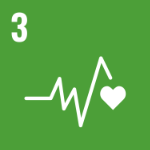

3. Good health and well-being
Social Signaling and Childhood Immunization: A Field Experiment in Sierra Leone
Abstract
This paper investigates social signaling in the context of childhood immunization in Sierra Leone. I introduce a durable signal – in the form of differently colored bracelets – which children receive upon vaccination and implement a 22-month-long experiment in 120 public clinics. Informed by theory, the experimental design separately identifies social signaling from leading alternative mechanisms. In a first main finding, I show that individuals use signals to learn about others’ actions. Second, I find that the impact of signals varies significantly with the social desirability of the action. In particular, the signal has a weak effect when linked to a vaccine with low perceived benefits and a large, positive effect when linked to a vaccine with high perceived benefits. Of substantive policy importance, signals increase timely and complete vaccination by 14 percentage points at a cost of approximately 1 USD per child. Finally, I structurally estimate a dynamic discrete-choice model to quantify the value of social signaling. I find that parents’ value of signaling completion is equivalent to the cost of walking 5-8 miles.
Read the paper here.
This content was originally published in Novafrica's website.

